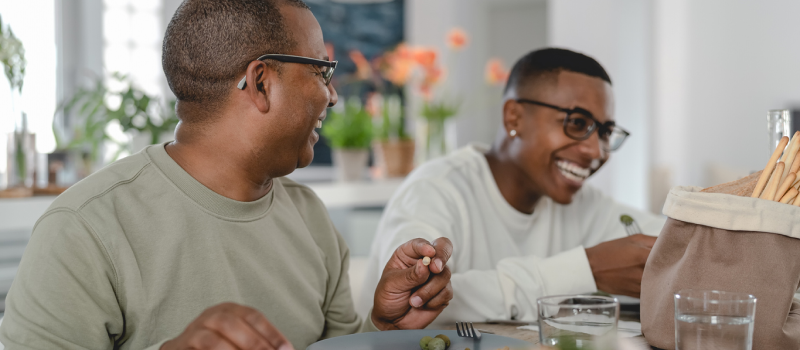
Table of Contents
What is the PLEASE Skill and How Can It Help?
Written By: Charlie Health Editorial Team

Clinically Reviewed By: Dr. Don Gasparini
September 27, 2023
8 min.
You can use PLEASE, a dialectical behavior therapy (DBT) skill, to prioritize self-care and well-being when you’re feeling overwhelmed. Keep reading to learn how.
Learn more about our Clinical Review Process
Table of Contents
What is the PLEASE DBT skill?
Have you ever felt overwhelmed by life’s demands, almost like you’re running on empty? If so, it’s important to pause and take a moment for self-care. Remember: you can’t pour from an empty cup.
One tool you can use to prioritize self-care and well-being is the “PLEASE” dialectical behavior therapy (DBT) skill. In short, PLEASE is an acronym that reminds you how to care for your physical and emotional needs. This skill is particularly helpful when you’re feeling emotionally vulnerable or are at risk of engaging in impulsive or self-destructive behaviors.
Keep reading to learn what the PLEASE DBT skill is, how it can benefit you, and how to use it when needed. Let’s start by breaking down the PLEASE acronym:
Physical illness
Balanced eating
Avoid mood-altering substances
Sleep
Exercise
Take care of any physical illnesses that may be exacerbating emotional distress.
Maintain balanced and regular eating habits.
Stay away from alcohol and drugs that may alter your mood and heighten emotional distress.
Restorative sleep can support emotional regulation.
Physical activity can help you manage stress and regulate your emotions.
Physical illness – PL
The “PL” in PLEASE stands for “physical illness,” corresponding to the first and last letter of “physical.” This is a reminder to take care of any physical illnesses or discomforts we might be experiencing. Neglecting physical health can exacerbate emotional distress. So, if you’re not feeling well physically, make sure to address it.
Balanced eating – E
The first “E” in PLEASE stands for “balanced eating” (corresponding to the first letter of “eating”) and encourages us to maintain balanced and regular eating habits. Skipping meals or overindulging in unhealthy foods can affect our mood and energy levels. Strive for balanced nutrition to support your emotional well-being.
Avoid mood-altering substances – A
The “A” in PLEASE stands for “avoiding mood-altering substances” and reminds us to be cautious with substances that can alter our mood, such as alcohol or recreational drugs. Overusing these substances can lead to impulsive behaviors and emotional instability.
Sleep – S
The “S” in PLEASE emphasizes the importance of getting enough restorative “sleep.” Sleep deprivation can intensify emotional reactivity and impair judgment. Aim for a consistent sleep schedule to support your mental and emotional health.
Exercise – E
The final “E” in PLEASE encourages regular “exercise.” Physical activity releases endorphins, which are natural mood lifters. Incorporating exercise into your routine can help you manage stress and regulate your emotions.

The Best Mental Health Skills Charlie Health Clients Learned During Treatment
Charlie Health Editorial Team
What can the PLEASE skill help?
The PLEASE DBT skill helps people manage their emotional well-being and mental health by addressing physical and lifestyle factors that impact mood and overall psychological balance.
While many people find the PLEASE skill effective, it is not a standalone solution for managing mental health. It is often used as part of a comprehensive DBT program or as a tool in individual therapy—contexts where many people find the skill more effective. For those who want to incorporate the PLEASE skill into their self-care routine, talking with a mental health professional may be helpful to ensure it is applied most effectively.
Here’s how the PLEASE skill can be beneficial:
Emotional regulation
The PLEASE skill helps people in regulating their emotions. By ensuring that physical needs are met, such as getting adequate sleep, maintaining a balanced diet, and avoiding mood-altering substances, people are better equipped to manage their emotions effectively. This can reduce emotional reactivity and mood swings.
Reducing impulsivity
Meeting physical needs through the PLEASE skill helps reduce impulsivity. When well-rested and not under the influence of substances, people are less likely to engage in impulsive and potentially harmful behaviors. This can be particularly helpful for those who struggle with self-destructive actions or impulsivity in challenging situations.
Improved decision making
Adequate sleep, proper nutrition, and exercise contribute to clearer thinking and improved decision-making. When people care for these physical needs, they can approach problems and challenges with a more rational and balanced mindset, leading to better decision-making outcomes.
Enhanced resilience
The PLEASE skill promotes physical and emotional resilience. Regular exercise, for example, helps people build physical resilience and cope with stress more effectively. This can make it easier to bounce back from setbacks and difficulties in life.
Strengthening self-care habits
Over time, practicing the PLEASE skill can lead to healthier self-care habits. People become more attuned to their physical and emotional needs and are more likely to engage in ongoing self-care practices. This can result in a more balanced and fulfilling life.
Support for mental health
The PLEASE skill can be particularly helpful for people dealing with mood disorders, anxiety, or emotional instability. It provides a structured approach to improving physical and emotional well-being, which can complement other therapeutic interventions.
Enhanced well being
Ultimately, the PLEASE skill is a tool for enhancing overall well-being. By paying attention to and taking care of one’s physical and emotional needs, people can experience a greater sense of balance, improved mood, and a higher quality of life.

Personalized DBT skills groups from home.
If you or someone you love needs help putting DBT skills to practice, we’re here to help
How to use the PLEASE DBT skill
Consider this example of how to use the PLEASE DBT skill to manage your emotional and physical health.
Imagine you’ve had a super hectic week at work, juggling deadlines and dealing with all sorts of stress. By Friday, you’re feeling completely drained, both mentally and physically. You’re tempted to grab a quick fix, like a sugary energy drink, to power through the day. But then, you remember the PLEASE skill.
Physical Illness – PL
First things first, you realize you’ve been ignoring that nagging headache all week. So, take a break and a pain reliever to ease the discomfort. Addressing that physical discomfort already feels like a weight lifted.
Balanced eating – E
Instead of reaching for the tempting candy bar in the office vending machine, you decide to have a proper lunch. You make a balanced meal choice, including some veggies and protein, to give your body the nourishment it craves.

Avoid mood-altering substances – A
You remember that your friend invited you for a happy hour after work. You think about it for a moment, but then you recall that alcohol tends to make you more emotional when you’re already stressed. So, you decide to have a non-alcoholic beverage and enjoy the company without the booze when you go after work.
Sleep – S
Knowing that a good night’s sleep can make a world of difference, you plan to skip that late-night TV binge-watching session and hit the hay earlier than usual. You preemptively set your alarm to wake up a bit later too, giving yourself some extra time to rest.
Exercise – E
Since your body has been feeling sluggish all week, you decide to walk to meet your friend. It’s a chance to get some fresh air and move your body, which always helps to clear your head.
By practicing the PLEASE skill in this scenario, you’ve addressed your physical and emotional needs. You’ve taken steps to ease your physical discomfort, nourished your body, made mindful choices about substances, and given yourself the gift of better sleep and exercise. As a result, you’re better equipped to tackle the day with a clearer mind and more energy.
The PLEASE skill is like your trusty sidekick, reminding you to take care of yourself, especially when life gets demanding. So, next time you feel like you’re running on empty, give it a try—it might just be the self-care boost you need.
What are DBT skills?
DBT skills, of which PLEASE is a part, are practical tools designed to help people manage their emotions, improve interpersonal relationships, and build a more fulfilling life. The skills stem from dialectical behavior therapy (DBT), which psychologist Dr. Marsha Linehan developed in the 1980s to treat people with borderline personality disorder (BPD). However, the therapy’s effectiveness in addressing many emotional and behavioral issues has led to widespread use among people with different mental health challenges. Here’s an overview of the central tenets of DBT and an explanation of how DBT skills can benefit people seeking emotional balance and well-being.
The four core modules of DBT skills
DBT skills are categorized into four core modules, each targeting a specific aspect of emotional regulation and interpersonal effectiveness as follows:
1. Mindfulness
Mindfulness is at the heart of DBT. It involves paying focused, non-judgmental attention to the present moment. By practicing mindfulness, people can learn to observe their thoughts, emotions, and sensations without reacting impulsively. This skill helps in reducing emotional reactivity and increasing self-awareness.
2. Distress tolerance
Life can be full of challenges and crises. Distress tolerance skills teach people how to tolerate and cope with distressing situations without resorting to self-destructive behaviors. This aspect of DBT equips people with strategies to ride out emotional storms and make healthier choices during difficult times.
3. Emotion regulation
Emotion regulation skills help people identify and manage their emotions effectively. This DBT module teaches techniques to decrease emotional vulnerability, increase positive emotional experiences, and reduce the intensity of negative emotions. It empowers people to take control of their emotional responses.
4. Interpersonal effectiveness
Healthy relationships are essential for our well-being. Interpersonal effectiveness skills teach people how to communicate their needs, set boundaries, and navigate interpersonal conflicts skillfully. When used in DBT, these skills enhance relationships, fostering understanding and connection with others.
Who can benefit from DBT skills?
As mentioned, DBT was initially developed for people with BPD, but its adaptability and effectiveness have made it a valuable resource for many people struggling with a range of mental health challenges. Here are some examples of people who can benefit from DBT skills:
- People with depression, anxiety, bipolar disorder, or other mood disorders can benefit from DBT skills to manage their emotions and reduce emotional turbulence.
- DBT skills can be incorporated into addiction treatment to help people with addiction issues cope with cravings, avoid relapse, and develop healthier coping mechanisms.
- Those struggling with self-harm or suicidal thoughts may find that DBT’s distress tolerance skills are particularly useful for finding healthier ways to manage their pain.
- Anyone seeking personal growth may want to use DBT skills as a resource to improve emotional well-being, build stronger relationships, and enhance overall quality of life.
DBT with Charlie Health
If you think DBT might be a useful tool for yourself or a loved one, Charlie Health is here to help.
Our virtual Intensive Outpatient Program (IOP) offers more than once-weekly therapy to support adolescents and teenagers with complex mental health issues. DBT skills are a core component of Charlie Health’s curriculum, and are incorporated into group sessions, individual therapy, and family therapy as necessary, in addition to other helpful therapeutic modalities.




